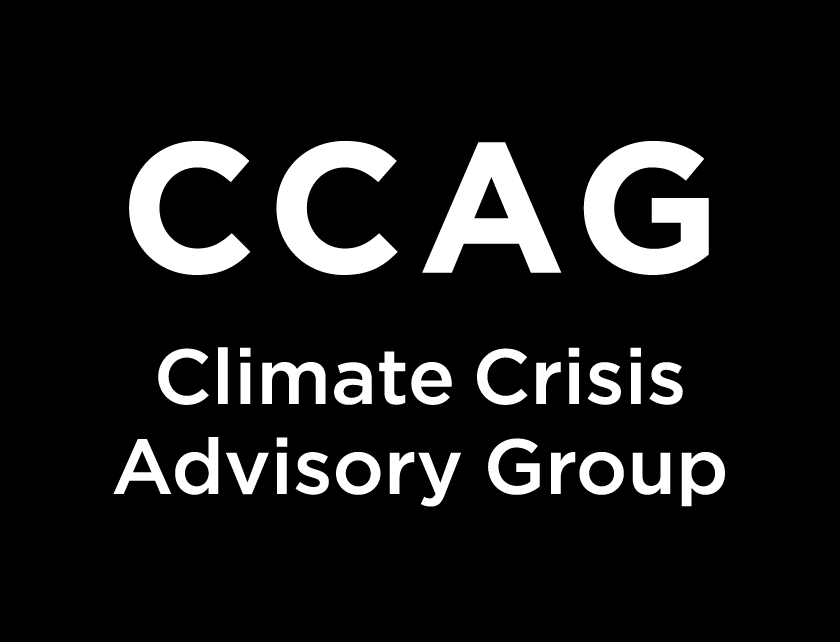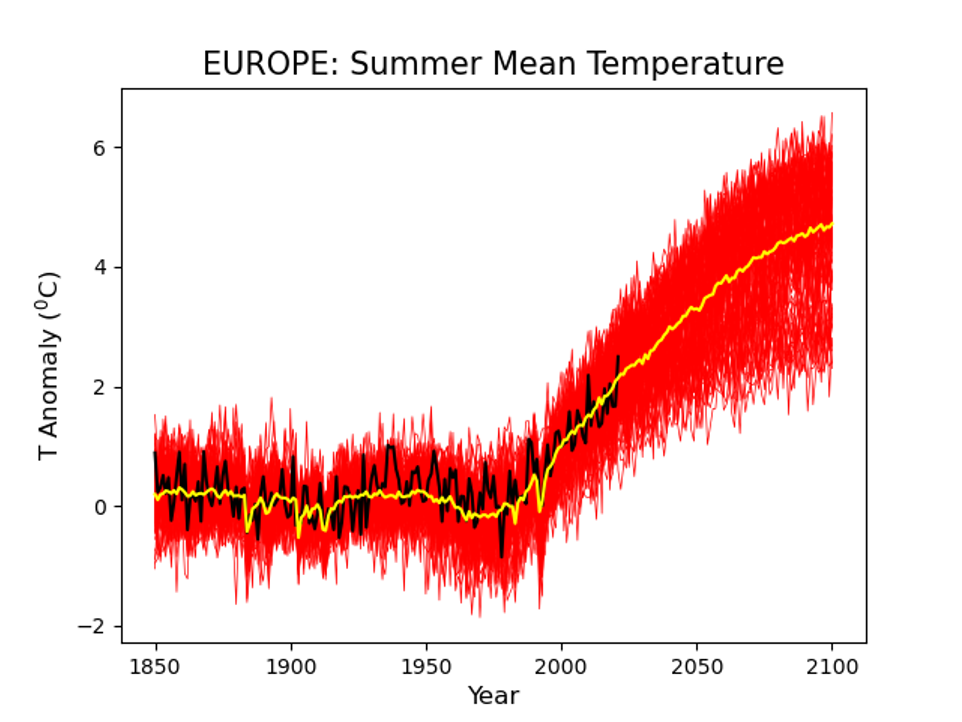Record-breaking heatwave will be an average summer by 2035, latest Met Office Hadley Centre data shows
London, 24 August 2022: The record-breaking heatwave experienced across Europe this summer will be considered an “average” summer by 2035, even if countries meet their current climate commitments so far agreed in negotiations under the 2015 Paris Agreement.
That’s according to the latest data from the Met Office Hadley Centre, commissioned by the Climate Crisis Advisory Group (CCAG).
The data (figure 1 below) looks at how rapidly temperatures are changing across Europe and tracks observed mean summer temperatures since 1850 against model predictions. It finds that, according to current predictions[1], an average summer in central Europe by 2100 will be over 4°C hotter than it was in the pre-industrial era.
Figure 1: Predicted and observed data on summer mean temperature across Europe by the Met Office Hadley Centre (2022). The red curves are individual runs of the model, the yellow curve is the average of these, and the black line is the observed summer temperatures in central Europe up to 2021.
The agreement between the observations over the period 1850 and 2021, black curve, and the model, the yellow curve, is very satisfactory. This gives us all confidence in the accuracy of the model itself, and puts to bed any doubts about the usefulness of these very powerful and detailed models.
This serves as an urgent reminder of the need for countries to go well beyond their nationally determined contributions so far pledged under the Paris Agreement, which aims to limit global warming to under 1.5°C if at all possible.
As such, CCAG argues for mitigative action to be pursued along three axes which the Group has termed the 3Rs.
Reduce emissions urgently, deeply and rapidly, while ensuring an orderly, just transition;
Remove CO₂ and other greenhouse gases from the atmosphere in vast quantities to reduce the total from today, in excess of 500ppm, to less than 350ppm;
Repair broken parts of the climate system, starting with the Arctic; to create a manageable future we must refreeze the Arctic Ocean which has already warmed to 3.5C above the pre-industrial levels and is exacerbating the extreme weather events around the world. The third ‘R’ is needed to buy time for us all to complete the actions on the first two.
Sir David King, Chair of the Climate Crisis Advisory Group, commented: “the science is clear that extreme weather currently faced across the world is at least in large part a consequence of human-induced climate change. The data released by the Met Office today shows that, even if countries meet their commitments to reduce emissions they have made so far, the situation is still set to get worse, with weather in Europe predicted to become even more extreme than seen this summer. This data doesn’t fully account for the instability of the Arctic, which we now know is a global tipping point which that could have major cascading consequences for the entire planet.
“One thing is abundantly clear, and that is that countries across the world must not only meet their NDCs, but voluntarily look to increase them. The time for ambitious, urgent action is now. It is only through the mitigative measures of Reduce, Remove and Repair, pursued with equal vigour and urgency, that we can hope to move away from the path to disaster we’re currently set on and achieve a manageable future for humanity.”
Professor Peter Stott from the Met Office Hadley Centre also commented:
“In the aftermath of the 2003 European heatwave, which is estimated to have killed over 70,000 people, I predicted that such temperatures, so exceptional at the time, would become the norm under continued emissions. That prediction has now been realised. The risks of extreme weather, including fires, drought and flash floods, will keep increasing rapidly unless emissions of greenhouse gases are reduced substantially.”
For more information, watch CCAG’s next public meeting on Thursday 25th August at 12:00 BST on Youtube or Twitter.
ENDS
Notes to editors
For media enquiries, please contact:
ccag@firstlightgroup.io
Dani Wiggins: (+44)7760 136108
About CCAG
CCAG is an independent group of experts which reflects a wide range of academic disciplines and indigenous knowledge, comprising 16 experts from 11 nations. It includes leading authorities in climate science, carbon emissions, energy, environment, and natural resources. Some of the members also participate in governmental advisory groups. Its function is complementary, not an alternative, to these other roles. It will look at in-depth policy and financial issues, including ones not currently on governmental agendas. All scientists have agreed to give up their time at no cost.
Virtual monthly meetings are held on the final Thursday of every month at 12:00 BST and streamed via Youtube and Twitter. To keep up to date with the group, visit ccag.earth or follow us on Twitter, Instagram and Youtube.
Full list of members:
Sir David King (Chair), Cambridge University – focus on alerting governments and institutions around the world to the dangers of the climate crisis and urgent need for climate repair
Alice Hill, Council on Foreign Relations - expertise in building resilience to catastrophic risks, in particular climate risk
Dr Arunabha Ghosh, The Council on Energy, Environment and Water – expert in public policy and climate change advisor to governments, industry, civil society and international organisations around the world
Professor Dr Johan Rockström, Potsdam University – specialises in environmental science with an emphasis on water resources and global sustainability
Professor Lorraine Whitmarsh, University of Bath – particular interest in perceptions and behaviours in relation to climate change, energy and transport
Professor Nerilie Abram, Australian National University – research expertise covering climate change impacts, from tropical oceans to Antarctica
Dr Tero Mustonen, Snowchange Cooperative – specialises in Arctic biodiversity and impacts to Indigenous and local communities and nomadic societies of the Arctic
Professor Mark Maslin, University College London – particular expertise in understanding the Anthropocene and how it relates to the major challenges facing humanity in the 21st century
Dr Robert W. Corell, US Global Environment Technology Foundation – particular interest in global and regional climate change and the link between science and public policy
Professor Qi Ye, Hong Kong University Science and Technology and Tsinghua University China – expert on China’s environmental policy with a focus on climate change, environment, energy, natural resources and urbanisation
Dr Klaus Lackner, Arizona State University – research interests include closing the carbon cycle by capturing carbon dioxide from the air, carbon sequestration, carbon foot-printing, innovative energy and energy and environmental policy
Professor Mercedes Bustamante, University of Brasilia – recognised for contributions to the ecological knowledge of threatened tropical ecosystems and their interactions with human-induced changes
Professor Lavanya Rajamani, Oxford University – specialist in the field of international environmental and climate change law
Professor Laura Diaz Anadon, University of Cambridge – expert on energy, climate and innovation policy, the drivers of technological change and policy evaluation
Dr Fatima Denton, United Nations University – particular expertise in natural resource management, especially in regards to Africa
Christophe McGlade, International Energy Agency - energy specialist, particularly in oil and gas analysis
[1] This is the ssp2-4.5 scenario, an ‘intermediate’ scenario of emissions giving a global warming by 2100 roughly consistent with estimates of warming under current NDCs. https://climateactiontracker.org/global/temperatures/

